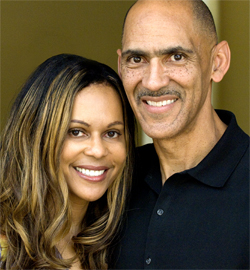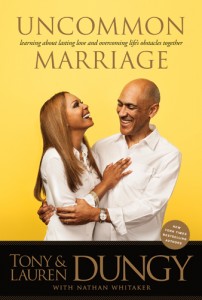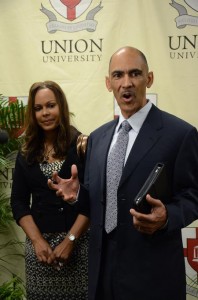 What does it take to build a marriage that will last? Tony and Lauren Dungy have together known the highest of highs and the lowest of lows. They fell in love, built a family, and made sports history when Tony became the first African American head coach to win the Super Bowl. Yet they’ve also gone through difficult, relationship-testing setbacks, including job loss and devastating personal tragedy. In a culture where it seems harder and harder to make marriage last, what has kept the Dungys strong through it all?
What does it take to build a marriage that will last? Tony and Lauren Dungy have together known the highest of highs and the lowest of lows. They fell in love, built a family, and made sports history when Tony became the first African American head coach to win the Super Bowl. Yet they’ve also gone through difficult, relationship-testing setbacks, including job loss and devastating personal tragedy. In a culture where it seems harder and harder to make marriage last, what has kept the Dungys strong through it all?
In “Uncommon Marriage”, Tony and Lauren share the secrets that hold them together, revealing what they’ve learned so far about being a good husband or wife; getting through times of loss, grief, or change; staying connected despite busy schedules; supporting each other’s dreams and goals; and helping each other grow spiritually. They offer encouragement and practical advice to equip your marriage to survive tough issues and flourish with joy, purpose, and partnership—in other words, to be a marriage that is truly uncommon.
Here are Lauren and Tony’s answers about their new book.
Lauren, how did the two of you meet? And how did you know each other was “the one?”
Lauren Dungy: Our pastor was instrumental in bringing us together as a couple. Tony spoke at the church that I was attending, and our pastor invited him to come back and attend church service. And in the meantime I think the wheels were turning in his head. He thought of the perfect person to introduce him to, and that was me. And so we met at church, and immediately I knew that there was something special about Tony.
And, Tony, how did you know?
TD: Well, Pastor Guest did introduce us. And he was telling me for weeks, “This is the person for you. I just have this good feeling.” I wasn’t so sure, but when I walked into Lauren’s house and we had a chance to sit down and talk, he was right and no doubt about it.
So you’ve been married for thirty-one years now. What would you say to your young engaged self then?
TD: I would say that it’s not going to be a perfect journey. Everything isn’t going to be smooth sailing, but it is going to be worth it. It’s going to definitely be worth it to persevere and to work at a marriage.
LD: There are definitely a lot of benefits to being married, especially to the one that you love and that you just enjoyed so many precious moments with and journeyed along the way. So, hang in there. If you’re challenged or you feel like you need to give up or take a break, stay in there together.
When you were writing this book what was the biggest surprise for you when you were going back over the material?
TD: I think the biggest surprise for me was how much you actually forget. We would remember a big event, but then we’d kind of struggle to remember the details. And then we’d go, “Oh yeah, I remember this.” And events that were really, really big in our life at the time thirty years later don’t always seem as big.
LD: One of the things that I was struck by was how much our life changed after we had children. We had to carve out time to be with each other, because our lives were just so busy with our children and we really didn’t have the date night. We had to work at getting that, and we had to really be intentional about making the time together, or there would be days that would go by without the two of us just spending time alone and having an adult conversation.
Both of you came from different family backgrounds. How did that help or hinder you? Did you have to overcome that? How did you deal with that?
TD: Definitely took us some time to adjust, because our families were very different. Similar in some ways but just my family much more quiet, not as outgoing. And so I had to become a better talker, and I think Lauren became a better listener.
LD: Absolutely. It’s so important to have that communication. And at the beginning I think there were moments when I felt we didn’t have any communication. We weren’t on the same page. And it was frustrating at times. I was trying to read Tony’s body language and what was he saying when he wasn’t talking to me? But that was because his background was so different from mine. Tony’s being kind. My family is very outgoing and boisterous and there’s never a dull moment. There’s always excitement, and everyone gives their opinion and often at the same time. Tony’s family is very calm and collect and very quiet. Yeah, so.
TD: And it took time for her to understand that me.
LD: Absolutely
TD: Being quiet didn’t mean that I wasn’t interested or didn’t have an opinion. It just wasn’t coming across as fast as maybe she was used to.
Talk about what that was like for you and Lauren when you took the Minnesota job, and how your actions changed, how you included Lauren, on the decision to go to Indy years later.
TD: Well, that’s still one of our disputes about what actually went on and what took place in going to Minnesota. But it was a career decision and a family decision and what was going to be the best for me. My work environment had changed, and I just really felt we had to go to Minnesota. We had some great, great friends and everything as great in Kansas City so moving forward was a tough time. It was probably the first time where we had a big decision to make and we didn’t agree on what we should do.
LD: It was very hard to leave our friends behind, and I felt like there was a breakdown in the communication when we moved to Minnesota. So that was a very trying time in our marriage, but we were able to work through it. And I think it was also a learning experience because when years later Tony accepted the position in Indianapolis we were onboard with it together. There were no secrets.
Did it help that you were stuck inside in Minnesota and it was cold?
LD: It was a challenge. I’m not sure if it helped, but it was definitely a challenge. But we forced ourselves to go outdoors, because you can only stay inside so long and that cabin fever sets in. So we made it a point to walk, to take those walks each night, even though it was below zero outside and we were frozen in our tracks. But we enjoyed it. We became fans of the outdoors. We just made it work.
You talk about your hobbies in Uncommon Marriage. You mention viewing homes/decorating, and biking, and the fact that you intentionally found things to do together. Is this something you’d encourage for young couples?
LD: It’s just really talking and expressing yourselves what you really enjoy and what you don’t enjoy. And we found that just being together doing simple things, relaxing, bike riding, going for walks or taking the dogs out. That was enjoyable. To other couples that might sound like, well, that’s not really exciting, or I need something a little more glamorous to do. But we enjoy doing the simple thing.
TD: I would say that, too. You don’t have to do what everybody else does. A romantic evening or going to a great restaurant may not be what you enjoy as opposed to just going to a kid-friendly place.
LD: Right.
TD: And being around the family. But I think you also have to reach into the other person’s personality and try to do things that they enjoy. You’ll find a lot of things that you both like to do, but if you can help yourself do the things that your spouse likes that’s what really makes it special.
LD: Mm-hmm.
And should you have your own interests as well?
LD: Oh, that’s a good question. I definitely think that you each have your own interests and you may share them and you may take on each other’s activities at times, but there are some things that I do that Tony just can’t stand. I mean, I love to read books and discuss them, and Tony, if it didn’t happen, it’s fiction, he doesn’t want any part of it. But that doesn’t stop me from going to my book clubs and having my discussions.
TD: And there are some things that you do when you’re single that you’re always going to enjoy, and you keep doing that. There are other things that you enjoy, but it may not be the right time from when you’re married. I love to play golf. I played a lot of golf when I was younger. I kind of gave that up as our kids came along. I loved to fish when I was single. I still enjoy that. That’s probably one of the things that Lauren knows I enjoy and I’m not really going to put that away. But if I had to I would, but I’m glad she still gives me the time.
Tony, you mention that you decided to stop golfing. If you were speaking to young couples where that’s a contention with kids at home and dad’s on the golf course or the mom’s out doing whatever mom does shopping with girls, whatever how do you help the other spouse understand the need for that sacrifice?
TD: I think you really have to know how critical time management is when you get married. When you’re single you’re used to making your own schedule. Now all of a sudden you’re married and its two schedules that have to match up, and you have to find time to spend with your spouse. So if there are things that are really taking a lot of time away from that.
So, Tony or, Lauren, you’re in a situation where you’re hoping Tony’s going to give up golfing so that he can be at home. You’re that wife staying home sitting at home going “What do I do?” What do you tell a wife who is in that position?
LD: Well, you know, Tony enjoyed golfing, but I think he came to realize that it was taking so much time away and he was missing out on some of the activities at home especially with the children. So once he realized that if he took off for five or six hours and was going to be away that there would be things that he would miss with the kids. And we were going to go on without him, so he made that decision wisely that he might need to give golfing up.
TD: I think communication is really important, too. To be able to tell your spouse.
LD: That’s true.
TD: This is important to me. And then half of communication is listening.
LD: Right.
TD: She may say it, but I’ve got to be able to listen and hear it and understand what’s on her heart.
Lauren, Tony’s coaching, you were holding down the fort, especially when you lived apart, what challenges did that create for when you were under the same roof again as far as who’s in charge at home?
LD: It definitely presents a challenge because Tony was away and I had to make all the decisions for the household, for the children, and for our lives. And although I shared some of those concerns and problems with him, I made the decisions. When he came back into the picture, he moved back into the household, and to turn the reins over to him it was still a little awkward because he didn’t do it quite the way we were doing it. Things were running smoothly, and then all of a sudden he had ideas. And I had to hold back and say, “No, Tony, that’s not quite the way it’s been done. And you really don’t realize how we’ve been doing things, how we’re been operating the last few months.” So it is a bit of a challenge. But we’re able to communicate, share, and get through those difficult times.
Many couples commute or have a spouse who travels, what is your advice to couples trying to find the balance of who is in charge in the home?
TD: I think the biggest thing is the person coming back into the situation you can’t just unilaterally make decisions and say this is what we’re going to do. You’ve got to find out how things have been functioning. And maybe there is a better way and maybe your way is different and better, but you’ve got to get to know what’s going on before you make a lot of changes.
LD: And I think the wife has to understand that her husband has been away for a number of months and doesn’t see the day-to-day operations of the house and has to give some grace and allow him to become re- acclimated to the household and not expect him just to take over and move in right away.
I think the headline here is Tony Dungy went to jail. Tony tell us about a time when a forgotten traffic ticket led to an arrest at your home and a lesson in racial profiling and how it affected your family.
TD: I did. I got a traffic ticket in Kansas City. I didn’t think it was warranted. I went to the trial, and the judge was trying to give me a break and just give me a five dollar fine, but I didn’t accept that. So I ended up going to jail, and it caught everybody by surprise. But it gave us a chance to talk to our kids about standing up for what you believe, doing the right things, and the fact that, again, everything isn’t going to be perfect and you are going to have some disappointments. You‘re going to have to overcome.
Our country has come a long way in regard to race. How would you encourage other families to deal with a situation like this?
TD: I think for us, again, it gave us a chance to talk to our kids about it. And we probably had been insulated from racial problems in just where we lived and the jobs that I had. But knowing that, again, not everything is perfect and you have to make sure that you’re doing the right things.
LD: Right.
TD: And that your conscience is good and your mind is pure. And then there are times when you have to stick up for what you believe in.
And you dealt with this with Eric when he was at Plant High School, and you talk about that pretty openly in the book about the racial issues with him even playing at that school and the fear that you faced. Is this, the traffic ticket and arrest, one of those times, one of those life lessons that came into play later? How did you deal with that in your home?
LD: Well it definitely was a life lesson. It was very hard because he was such a young boy when it happened, just a young teenager. And so as parents we really had to pray about how much information to give to Eric to make him aware of the situation and severity of it. So we were really working together on this, sharing with Eric the dangers of a person who has some ignorant thinking and a mindset that could affect him. So we prayed about this long and hard before we really shared the entire story with him. But we wanted him to be safe and we wanted him to know that when he left the household that he wasn’t going to be attacked or harmed in any way. So we had to be very honest and open with him.
TD: I think it gave us a chance to share with all of our children that.
LD: Right.
TD: Things like this can happen. There is racism out there. But how are we going to respond and how are we going to think? And no matter what happens to us we’re going to treat people as individuals and not judge a whole group by.
LD: Right.
TD: Just what the actions of one person. And that was an important lesson.
Lauren, you seemed strongly emotional about Tony’s firing in Tampa. What were you, personally, experiencing?
LD: I was disappointed with what happened and the way the relationship soured after so many years of working together and just really enjoying each other. I’m just saddened by the way things turned out.
TD: I think wives are always more hurt by their husband’s being traded, fired or cut. We tend to get over it, think that that’s just business. But for the wives so often it’s more than that. And we have to try to understand that as husbands.
LD: And I think because we became so emotionally involved it wasn’t simply Tony going to work. We were all involved in it. And so when Tony was fired, we all felt the sting of it. So it was definitely an emotional time.
So what would be your advice to other couples as you’re going through this? Because, Lauren, I know this is your husband’s job. You can’t just jump in and with respect to him. How do you handle that as a wife?
LD: You definitely have to be there. And my husband has to know that I am supporting him one hundred percent. And I definitely had to pray a lot for the feelings that came into my mind at the time when we were walking through it. And when Tony was fired, he left and I had to stay behind and prepare the house for the market and allow the kids to finish school. So it was very challenging, and I definitely relied on the Lord to get me through that time.
Have you had any interaction with the Glazers (owners of the Buccaneers)?
LD: We have seen them at some events, and it really has been a pleasant time. We’re cordial with each other. I don’t think there are any hard feelings. I think time heals disappointment.
TD: I know for me, you just really have to look at the Lord orchestrating everything. All of that was part of his plan.
LD: Right. Exactly.
TD: And then he had a plan for us to go to Indianapolis. So even though we’re disappointed and you’re hurt about losing your job, you have to look forward to what God has for you.
LD: You have to look forward. I definitely agree. I think it’s important, because you do have to look forward and you do have to focus ahead on what the Lord has for you. And you’re not going to know that if you’re wallowing in your pain and your sorrows and disappointment of what’s happening.
TD: But those are tension points in a marriage or relationship, because husbands say, Okay. I’ve got to go to the next job. We’ve got to make some money. And you do have to be sensitive to your family, your wife, and their emotional tie in. It’s not something that we spend a lot of time thinking about, because I can’t afford to get emotionally tied into what the Glazers are doing or what they’re thinking. I’ve got to look for another job.
LD: Right. And then when you did get the job you became involved in that job and we were kind of left behind with, Wow, this is tough.
That’s not an easy situation.
LD: No, it’s not. And the entire family was involved with the Buccaneer organization. Our children had developed relationships with the players, and we were involved in community events. So we all felt that it was a big family that we were involved in. And then when Tony left we were left behind trying to deal with it. So we definitely needed the Lord and relied on our faith to get us through a very trying time.
Lauren, you mention in the book that you had to push to pursue the proper care for your son, Jordan, and that you and Tony weren’t on the same page. How did you deal with that?
LD: Well, I think Tony had to understand that it was important that we really had to be proactive with his care. There were certain things that needed to be addressed immediately, and sometimes you do have to be a little more forceful, more than your personality would normally allow you to be with your other children. And so it was important to follow up and to call the doctor’s office a second time, if you didn’t get the answers or if you didn’t get that appointment in a timely fashion. And I have more of a forceful personality, and I didn’t mind doing it because I love my child and would never want him to suffer the consequences because I neglected to follow up on something.
What did that do to your marriage when Lauren found out she was right and it was good that she’d pushed through?
TD: I think you learn that God puts opposites together many times not to make difficulties but to get the best out of a marriage and you rely on each other’s strengths. So if you look at it that way, that it’s a partnership going forward and not she’s doing it this way, I think this, or who was right and who was wrong but the end result that counts. That’s important.
